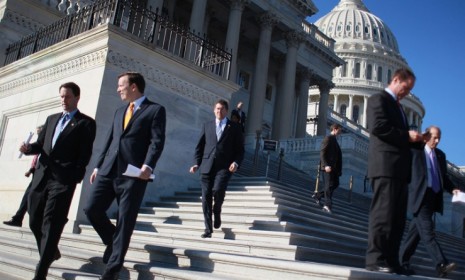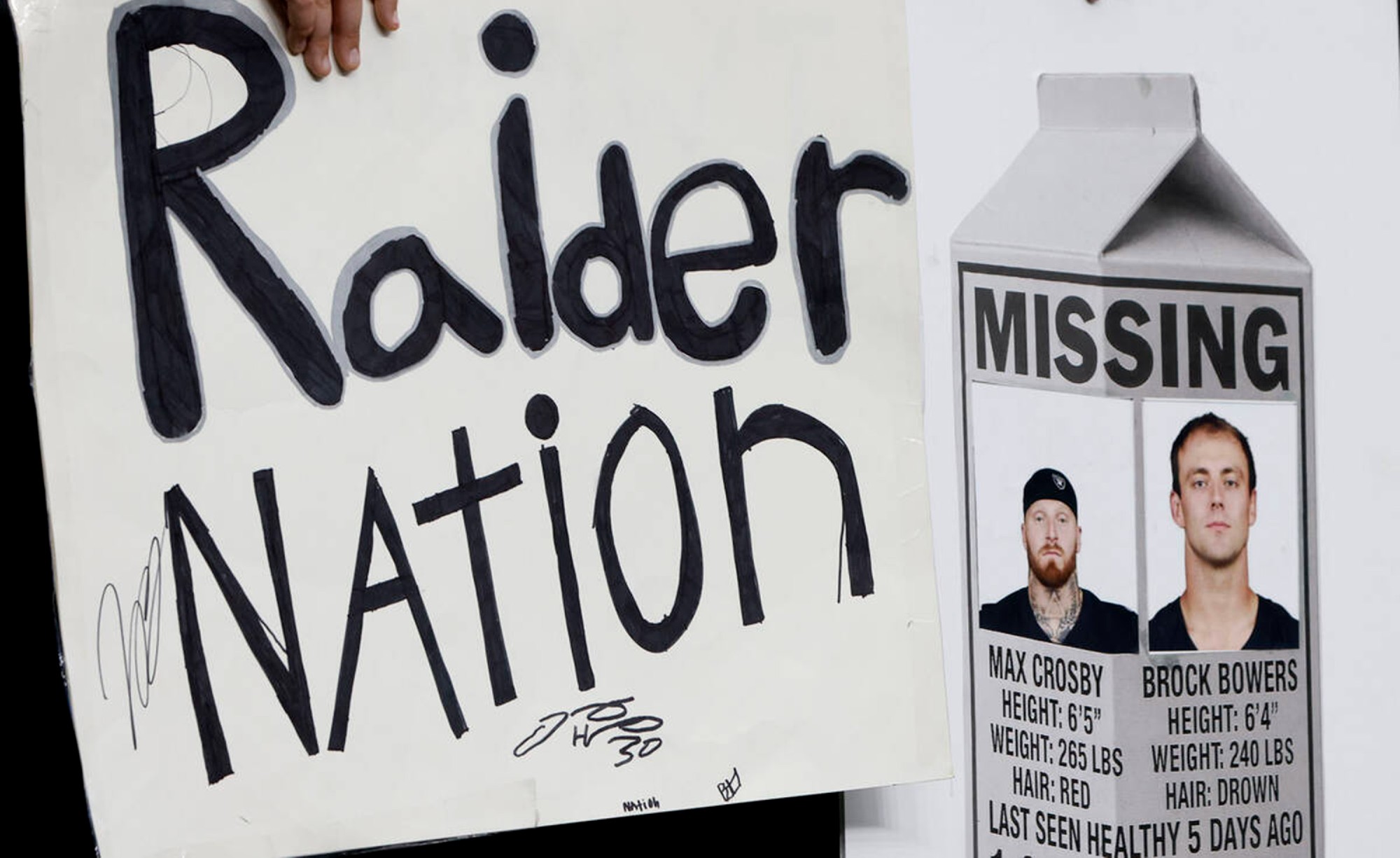Congress' 'wild final month': 5 predictions for December
A fight over unemployment insurance. Competing jobs bills. Averting a government shutdown. Clearly, Congress has one heck of a month in store

The brinksmanship and squabbling that have characterized the 112th Congress aren't going to take a holiday in December. If anything, after the collapse of the much-hyped "super committee," Congress has an unusually busy — and potentially very ugly — set of budget fights before Christmas. Here are five items that the House and Senate have on their daunting to-do list as they return for a "wild final month" of 2011:
1. Avert a government shutdown
The biggest item Congress has to tackle is its "most basic function: Funding for a government that has had to live with the uncertainty of endless stop-gap measures for the past 14 months," says David Rogers at Politico. The most recent short-term budget expires Dec. 16, and Senate Democrats are proposing rolling all 2012 spending bills into a $1 trillion omnibus bill. That'll be thorny, says Chad Pergram at Fox News. House GOP leaders have vowed to pass each appropriations bill separately and deliberately. They haven't, and with the clock running down, "the House GOP may have to swallow hard" and pass a spending super-bill to avoid a shutdown.
The Week
Escape your echo chamber. Get the facts behind the news, plus analysis from multiple perspectives.

Sign up for The Week's Free Newsletters
From our morning news briefing to a weekly Good News Newsletter, get the best of The Week delivered directly to your inbox.
From our morning news briefing to a weekly Good News Newsletter, get the best of The Week delivered directly to your inbox.
2. Unemployment insurance
With the unemployment rate hovering around 9 percent, Congress has extended the usual 26 weeks of unemployment benefits to up to 99 weeks. But unless lawmakers extend the payments, more than 2 million uninsured workers will be out of luck by mid-February. Republicans want tens of billions in spending cuts to pay for the proposed unemployment benefit extension. It's certainly laudable to demand offsets, says Fox News' Pergram, "but the optics of voting against the unemployed at Christmas is a different enterprise altogether."
3. Dueling jobs bills
The super committee had been dead only hours before "President Obama was already calling for Congress to enact elements of his $447 billion jobs plan," says Mike Lillis at The Hill. Democrats argue that Obama's stymied proposals would "jump-start the economy and bring down unemployment." Republicans counter that the Democrat-controlled Senate is, in House Speaker John Boehner's (R-Ohio) words, sitting on "more than 20 bipartisan jobs bills passed by the House."
A free daily email with the biggest news stories of the day – and the best features from TheWeek.com
4. A payroll tax cut
A top priority for Obama and congressional Democrats is an extension — or even expansion — of the payroll tax holiday that expires Dec. 31. Employees paid 4.2 percent in Social Security payroll taxes this year, and without congressional action, that rate will climb to 6.2 percent in 2012. Obama actually wants to lower that tax to 3.1 percent, which would save the average family $1,500. But this is one tax cut the GOP is unenthusiastic about. They might go along with it, but at a price, and the Democrats' proposal to pay for the tax holiday with a surtax on millionaires is a nonstarter.
5. The Medicare "doc fix"
"Politicians of both parties outdo each other vying for the approval of seniors," but they've still "put Medicare in the crosshairs again" by not dealing with a looming 27 percent cut in government reimbursements for doctors who take Medicare patients, says the AP's Ricardo Alonso-Zaldivar. Every year since 2003, Congress has patched that growing gap with a "doc fix." The super committee was supposed to solve this problem by readjusting the payment schedule, but now it's up to Congress to sort out how to pay for this year's multibillion-dollar gap-filler. "There's not a lot of time to play ping-pong," a lobbyist tells the AP. "It's entirely possible given past performance that Congress misses the deadline."
-
 The Week’s big New Year’s Day quiz 2026
The Week’s big New Year’s Day quiz 2026Quiz of the Year How much do you remember about 2025’s headlines? Put yourself to the test with our bumper quiz of the year
-
 Is tanking ruining sports?
Is tanking ruining sports?Today's Big Question The NBA and the NFL want teams to compete to win. What happens if they decide not to?
-
 ‘Netflix needs to not just swallow HBO but also emulate it’
‘Netflix needs to not just swallow HBO but also emulate it’instant opinion Opinion, comment and editorials of the day
-
 Bari Weiss’ ‘60 Minutes’ scandal is about more than one report
Bari Weiss’ ‘60 Minutes’ scandal is about more than one reportIN THE SPOTLIGHT By blocking an approved segment on a controversial prison holding US deportees in El Salvador, the editor-in-chief of CBS News has become the main story
-
 Has Zohran Mamdani shown the Democrats how to win again?
Has Zohran Mamdani shown the Democrats how to win again?Today’s Big Question New York City mayoral election touted as victory for left-wing populists but moderate centrist wins elsewhere present more complex path for Democratic Party
-
 Millions turn out for anti-Trump ‘No Kings’ rallies
Millions turn out for anti-Trump ‘No Kings’ ralliesSpeed Read An estimated 7 million people participated, 2 million more than at the first ‘No Kings’ protest in June
-
 Ghislaine Maxwell: angling for a Trump pardon
Ghislaine Maxwell: angling for a Trump pardonTalking Point Convicted sex trafficker's testimony could shed new light on president's links to Jeffrey Epstein
-
 The last words and final moments of 40 presidents
The last words and final moments of 40 presidentsThe Explainer Some are eloquent quotes worthy of the holders of the highest office in the nation, and others... aren't
-
 The JFK files: the truth at last?
The JFK files: the truth at last?In The Spotlight More than 64,000 previously classified documents relating the 1963 assassination of John F. Kennedy have been released by the Trump administration
-
 'Seriously, not literally': how should the world take Donald Trump?
'Seriously, not literally': how should the world take Donald Trump?Today's big question White House rhetoric and reality look likely to become increasingly blurred
-
 Will Trump's 'madman' strategy pay off?
Will Trump's 'madman' strategy pay off?Today's Big Question Incoming US president likes to seem unpredictable but, this time round, world leaders could be wise to his playbook